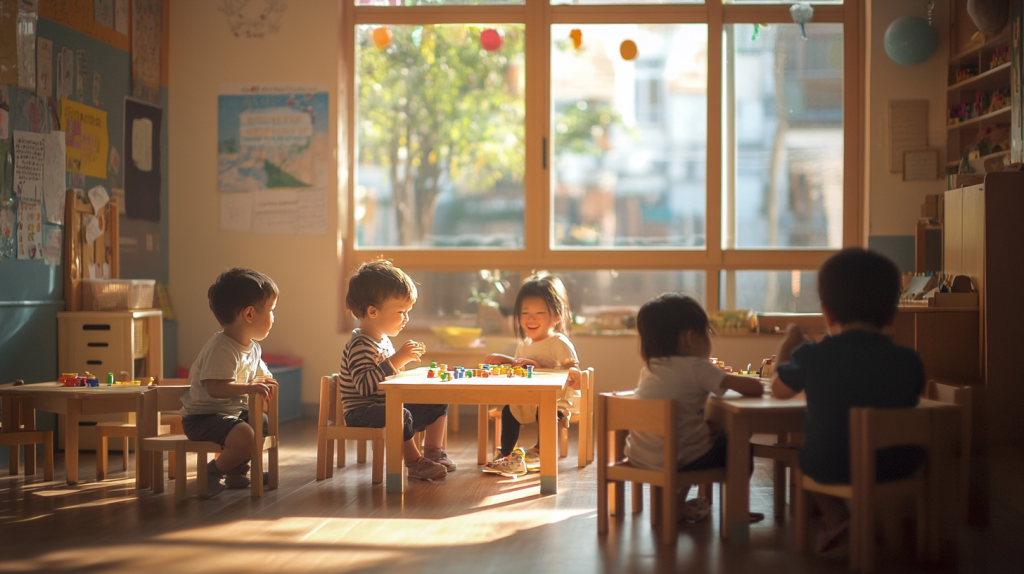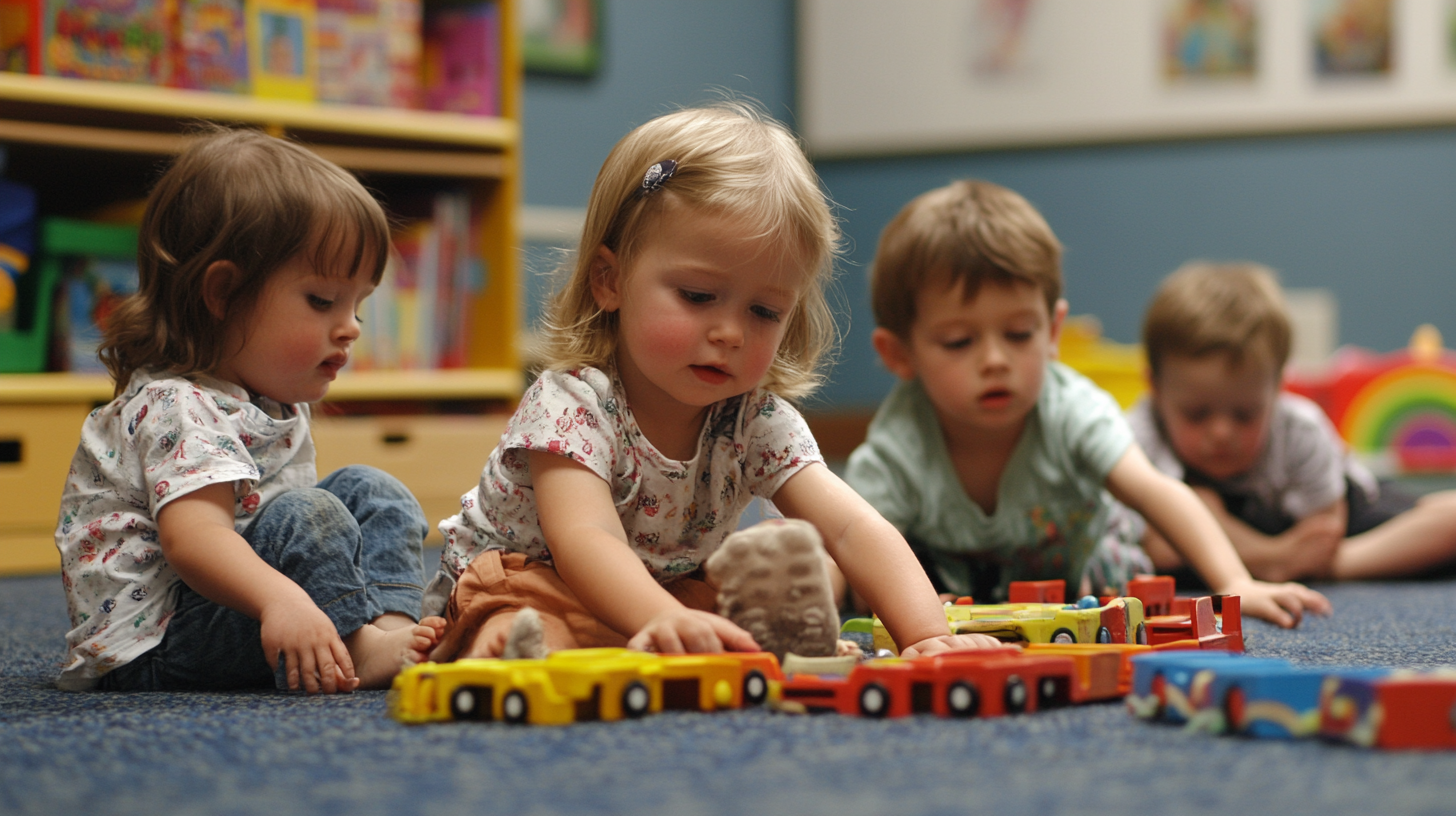Structured play is not just about having fun; it’s a vital component of early childhood development. It offers children a chance to learn new skills, explore their environment, and engage in meaningful interactions with others. In this article, we will delve into the importance of structured play, how it differs from other types of play, and its impact on early childhood development.
Understanding Structured Play
Structured play refers to activities that are organized and directed by an adult, often with specific learning objectives in mind. Unlike free play, which allows children to explore and interact with their environment without a set agenda, structured play has a clear purpose and often follows a set of rules or guidelines.
The Definition and Framework of Structured Play
Structured play is a defined and purposeful approach to engaging children in learning. It includes activities that are pre-planned with specific goals and objectives. This framework ensures that playtime is not only fun but also educational, providing clear benefits for developmental growth.
Key Characteristics of Structured Play
Structured play is marked by several defining characteristics that distinguish it from other forms of play:
- Guidance and Supervision: An adult usually oversees structured play, providing direction and support to ensure that children are engaged and learning. This guidance helps maintain focus and ensures that educational goals are met.
- Set Goals: Activities are designed with specific learning outcomes in mind, such as developing fine motor skills, enhancing language abilities, or fostering social interactions. This goal-oriented approach makes structured play a powerful learning tool.
- Rules and Structure: There are often specific rules that children need to follow, which helps them understand boundaries and expectations. This structure is crucial for teaching children about discipline and cooperation.
Differentiating Structured Play from Free Play
It’s important to distinguish between structured and free play to appreciate their unique contributions to child development. Structured play is intentional and goal-driven, often requiring adult supervision, whereas free play allows for more spontaneous and child-directed activities. Both play styles are essential, but structured play specifically targets developmental milestones.
Forms of Structured Play
Structured play can take many forms, including educational games, group activities, and arts and crafts projects. Each of these activities offers unique benefits and opportunities for learning. Educational games can enhance cognitive skills, group activities foster social interactions, and arts and crafts promote creativity and fine motor skills.

The Benefits of Structured Play
Structured play supports various areas of a child’s development, including cognitive, social, emotional, and physical growth.
Cognitive Development
Structured play activities are designed to challenge a child’s thinking and problem-solving skills.
- Critical Thinking and Logical Reasoning: For example, puzzles and educational games encourage children to think critically and develop logical reasoning abilities. These activities provide scenarios where children must use logic to solve problems, enhancing their intellectual capacities.
- Understanding Cause and Effect: Through structured play, children learn to understand the relationship between actions and outcomes. This understanding is crucial for developing a deeper comprehension of the world around them.
- Memory and Concentration: These activities help children improve memory and enhance concentration. Structured play often requires children to remember rules or sequences, which strengthens their ability to focus and recall information.
Social and Emotional Development
Through structured play, children learn to interact with their peers, share resources, and cooperate to achieve common goals.
- Communication and Teamwork: This interaction fosters important social skills such as communication, empathy, and teamwork. Children learn to express their ideas and listen to others, which is essential for building relationships.
- Empathy and Emotional Expression: Structured play provides a safe environment for children to express their emotions and learn to manage them effectively. Activities often involve role-playing, which can help children understand different perspectives and develop empathy.
- Conflict Resolution: Engaging in structured play teaches children how to resolve conflicts and work together harmoniously. These skills are vital for navigating social dynamics both inside and outside of structured play environments.
Physical Development
Many structured play activities involve physical movement, which promotes the development of motor skills.
- Hand-Eye Coordination: Activities such as building blocks, drawing, and playing sports help children improve their hand-eye coordination. This skill is fundamental for tasks ranging from writing to playing musical instruments.
- Balance and Agility: Structured play often includes activities that require physical balance and agility, such as obstacle courses or dance. These activities help children develop strength and coordination.
- Overall Physical Health: Engaging in structured physical activities supports a child’s overall physical health and well-being. Regular physical play helps in maintaining a healthy weight and promotes cardiovascular fitness.
The Role of Structured Play in a Learning Environment
In educational settings, structured play is often integrated into the curriculum to enhance learning. Discovery time learning rooms and play-based learning frameworks are effective strategies for incorporating structured play into early childhood education.
Discovery Time Learning Room
A discovery time learning room is a dedicated space where children can engage in structured play activities that are designed to stimulate curiosity and exploration.
- Stimulating Curiosity: These rooms are often equipped with a variety of educational materials and resources that encourage hands-on learning. The environment is designed to spark curiosity and encourage children to ask questions and seek answers.
- Facilitated Learning: Teachers facilitate activities that align with educational goals, allowing children to explore new concepts and ideas in a supportive environment. This approach ensures that play is both enjoyable and educational.
- Hands-On Exploration: Discovery rooms prioritize experiential learning, where children learn through doing. This hands-on approach helps children retain information better and fosters a love for learning.
Play-Based Learning
Play-based learning is an educational approach that uses play as a primary method for teaching and learning.
- Integration of Play and Education: In a play-based learning environment, structured play activities are carefully planned to support specific educational objectives. This approach recognizes the value of play in fostering creativity, critical thinking, and problem-solving skills.
- Development of Soft Skills: By integrating structured play into the curriculum, educators can create a dynamic and engaging learning experience for young children. Skills such as adaptability, collaboration, and resilience are naturally developed in such settings.
- Encouraging Lifelong Learning: Play-based learning instills a passion for learning that can last a lifetime. By associating learning with play, children are more likely to view education as a positive and enjoyable experience.
Benefits of Structured Play in Educational Settings
Structured play in schools offers numerous benefits that extend beyond traditional classroom learning.
- Enhanced Academic Skills: Through play, children can improve literacy and numeracy skills in a fun and engaging way. Activities such as storytelling and counting games make learning enjoyable and effective.
- Social Interaction and Peer Learning: Educational settings provide opportunities for children to learn from each other through structured play. This peer learning is invaluable for developing social skills and building friendships.
- Emotional Support and Growth: Structured play environments offer emotional support, helping children build confidence and self-esteem. Teachers can guide children through challenges, fostering a growth mindset and resilience.

Implementing Structured Play at Home
Parents can also play a crucial role in supporting their child’s development through structured play at home. Here are some tips for incorporating structured play into your daily routine:
Create a Play Schedule
Establish a regular schedule for structured play activities, ensuring that your child has dedicated time for learning and exploration each day.
- Routine and Predictability: This routine helps children develop a sense of structure and predictability, which can be comforting and beneficial for their development. A consistent schedule provides stability and encourages positive habits.
- Balancing Play and Rest: A structured schedule ensures that children have a balanced day with time for play, rest, and other activities. This balance is essential for maintaining energy levels and supporting overall well-being.
- Incorporating Variety: A well-planned schedule includes a variety of activities to keep children engaged and interested. By offering diverse play options, parents can cater to different interests and developmental needs.
Choose Age-Appropriate Activities
Select activities that are suitable for your child’s age and developmental stage.
- Matching Developmental Needs: Younger children may benefit from simple games and puzzles, while older children may enjoy more complex activities that challenge their cognitive and problem-solving skills. Understanding your child’s developmental stage is key to choosing the right activities.
- Safety Considerations: Ensure that chosen activities are safe and suitable for your child’s age. Safety is paramount, and activities should be free of hazards that could pose risks to young children.
- Encouraging Progression: As children grow, gradually introduce more challenging activities to promote learning and development. This progression helps maintain interest and fosters continuous growth.
Encourage Exploration and Creativity
While structured play has specific objectives, it’s important to allow children the freedom to explore and express their creativity within the activity.
- Fostering Imagination: Encourage them to think outside the box and come up with their own solutions to problems. This approach nurtures creativity and innovation, skills that are invaluable in the modern world.
- Supporting Individuality: Allowing children to explore and experiment helps them develop a sense of individuality and self-confidence. It’s important to celebrate their unique ideas and contributions.
- Balancing Structure and Flexibility: While maintaining the structured nature of play, it’s beneficial to incorporate flexibility to accommodate children’s interests and ideas. This balance makes playtime both educational and enjoyable.
Engage in Play Together
Participating in structured play with your child provides an opportunity for bonding and allows you to guide and support their learning.
- Building Stronger Relationships: Engaging in play together strengthens the parent-child bond and creates lasting memories. It’s an opportunity to connect on a deeper level and understand your child’s interests and personality.
- Modeling Positive Behaviors: It also gives you a chance to model positive social behaviors and reinforce the skills they are developing. Children learn by observing adults, making your involvement crucial for their learning process.
- Providing Guidance and Feedback: Playing together allows parents to offer guidance and constructive feedback, helping children refine their skills and build confidence. This support is essential for encouraging growth and development.
Conclusion
Structured play is an essential component of early childhood development, offering numerous benefits across cognitive, social, emotional, and physical domains. By incorporating structured play into both educational settings and home environments, we can support children’s growth and help them develop the skills they need to succeed in life.
Structured play is more than just a fun activity; it’s a powerful tool for learning and development. By understanding its role and implementing it effectively, we can provide children with the foundation they need to thrive. Through structured play, we nurture well-rounded individuals who are prepared to face the challenges of the future with confidence and creativity.
Contact Discovery Time Learning Center
Are you ready to enhance your child’s development through structured play? At Discovery Time Learning Center, we are dedicated to providing a nurturing environment that fosters growth, creativity, and learning.
Get in touch with us today! Whether you have questions about our programs or want to learn more about how we can support your child’s journey, our team is here to help.
Contact us now to discover how structured play can make a difference in your child’s life!



